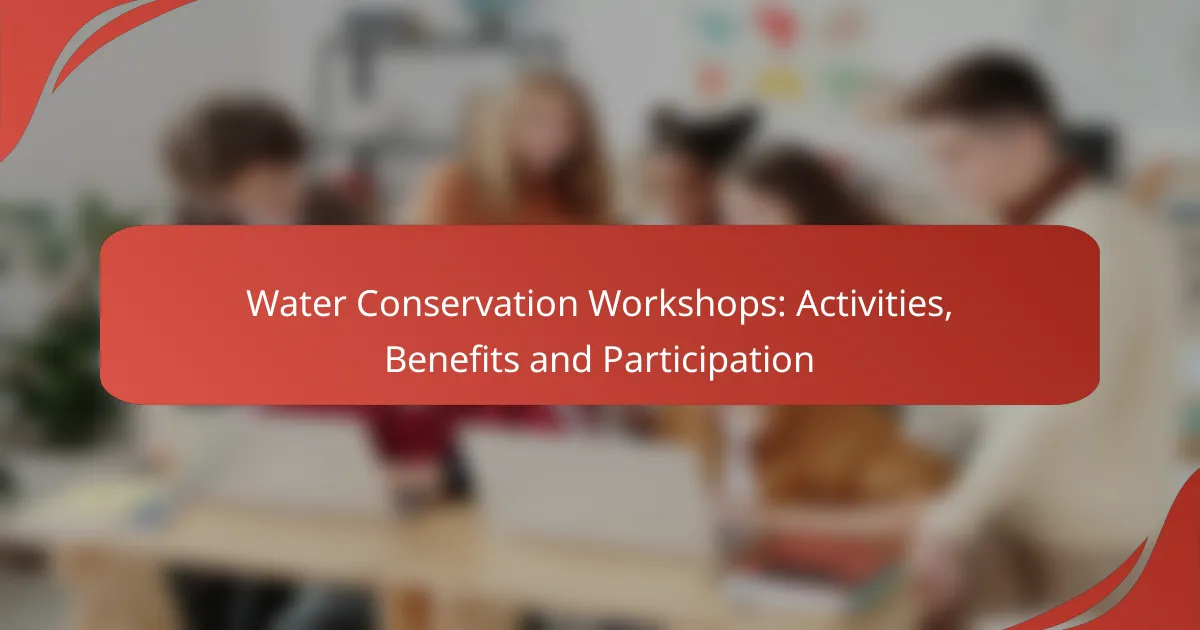Water conservation workshops are essential for educating individuals on effective practices to save this vital resource. Through hands-on activities, participants gain practical skills and insights that empower them to make informed decisions about water sustainability in their daily lives.

What activities are included in water conservation workshops?
Water conservation workshops typically include a variety of activities designed to educate participants on effective water-saving practices. These hands-on experiences help individuals understand the importance of conserving water and provide practical skills they can implement in their daily lives.
Hands-on gardening techniques
Hands-on gardening techniques focus on methods that reduce water usage while maintaining healthy plants. Participants learn about xeriscaping, which involves selecting drought-resistant plants and using mulch to retain moisture. Techniques such as drip irrigation and soil moisture monitoring are also covered to enhance water efficiency in gardens.
Rainwater harvesting demonstrations
Rainwater harvesting demonstrations teach participants how to collect and store rainwater for later use. Workshops often include building simple rain barrels or cisterns, showcasing how to set up a system that can reduce reliance on municipal water supplies. This practice can significantly lower water bills and promote sustainable water use.
Water-efficient landscaping practices
Water-efficient landscaping practices emphasize designing outdoor spaces that require minimal irrigation. Participants explore concepts like native plant selection, proper lawn care, and efficient irrigation systems. Learning to group plants with similar water needs can lead to healthier landscapes and lower water consumption.
Community clean-up events
Community clean-up events are organized to promote awareness of local water sources and their preservation. Participants engage in activities such as picking up litter from rivers, lakes, or beaches, which helps prevent pollution and protects aquatic ecosystems. These events foster community spirit and highlight the connection between clean environments and water conservation.
Educational presentations on water usage
Educational presentations on water usage provide valuable insights into local water issues and conservation strategies. Experts may discuss the impact of climate change on water resources, the importance of reducing water waste, and practical tips for everyday conservation. These sessions aim to empower participants with knowledge that can lead to informed decisions regarding water use.
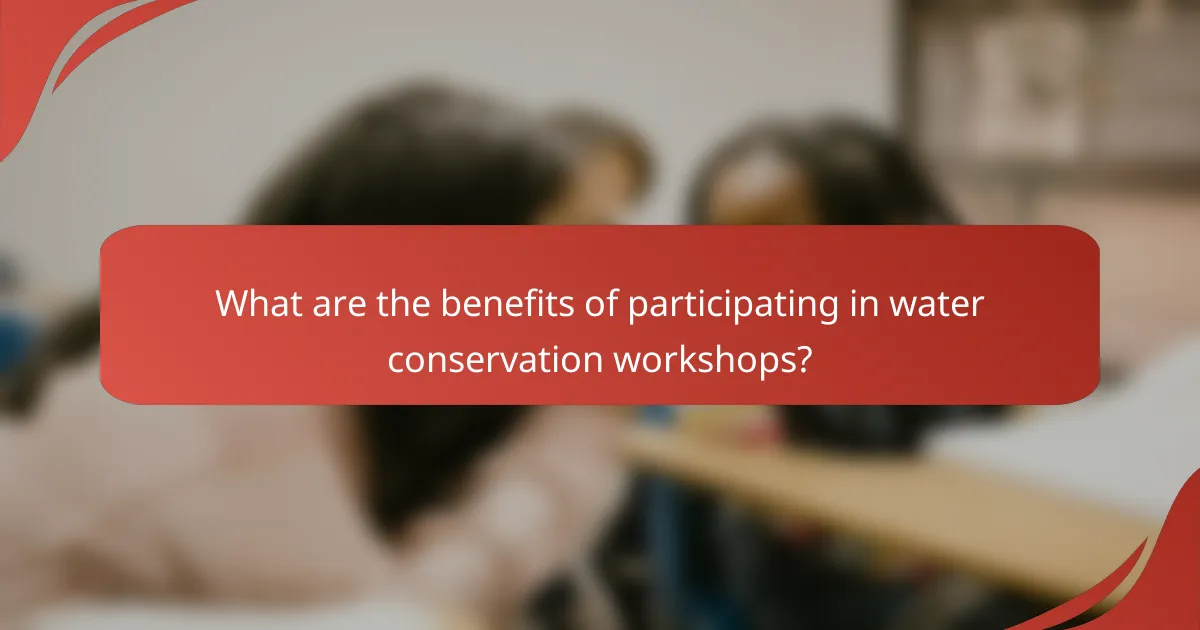
What are the benefits of participating in water conservation workshops?
Participating in water conservation workshops offers numerous advantages, including enhanced skills in managing water resources, opportunities for community involvement, and access to valuable expert insights. These workshops empower individuals and groups to make informed decisions that positively impact local water sustainability.
Improved water management skills
Water conservation workshops provide practical training on efficient water use and management techniques. Participants learn about methods such as rainwater harvesting, xeriscaping, and efficient irrigation practices. These skills can lead to significant reductions in water waste, benefiting both households and larger communities.
For instance, understanding how to implement drip irrigation can save substantial amounts of water compared to traditional methods. This not only conserves water but also enhances plant health and yields in gardens and agricultural settings.
Community engagement and networking
These workshops foster a sense of community by bringing together individuals who share a common interest in water conservation. Participants have the chance to meet like-minded people, exchange ideas, and collaborate on local projects. This networking can lead to stronger community ties and collective action towards water sustainability.
Engaging with local organizations and stakeholders during these workshops can also open doors to future partnerships, enhancing the impact of conservation efforts within the community.
Access to expert advice and resources
Water conservation workshops often feature experts who provide valuable insights and resources. Participants gain access to the latest research, best practices, and tools that can aid in effective water management. This expert guidance is crucial for implementing successful conservation strategies.
Additionally, many workshops offer handouts, guides, and online resources that participants can refer to after the event, ensuring ongoing support in their conservation efforts.
Increased awareness of local water issues
Attending water conservation workshops raises awareness about specific water challenges faced by local communities. Participants learn about issues such as drought, pollution, and over-extraction of water resources. This knowledge is essential for understanding the broader context of water conservation efforts.
By becoming informed advocates, participants can contribute to local discussions and initiatives aimed at addressing these pressing water issues, ultimately leading to more sustainable practices within their communities.

How can individuals participate in water conservation workshops in the United States?
Individuals can participate in water conservation workshops in the United States by engaging with local organizations, attending community events, or joining online sessions. These workshops provide practical knowledge and skills to help conserve water effectively.
Register through local environmental organizations
Many local environmental organizations offer water conservation workshops that individuals can register for. These organizations often provide a calendar of events on their websites, detailing upcoming workshops and how to sign up.
Registration typically involves filling out an online form or contacting the organization directly. Some workshops may charge a small fee, while others are free, depending on the funding and resources of the organization.
Attend community events and fairs
Community events and fairs often feature water conservation workshops as part of their programming. These gatherings provide an excellent opportunity to learn about water-saving techniques while connecting with local experts and fellow community members.
Look for events at local parks, community centers, or schools, where workshops may include hands-on activities like rainwater harvesting demonstrations or xeriscaping tips. Participation is usually open to all, making it an accessible option for anyone interested.
Join online webinars and virtual workshops
Online webinars and virtual workshops have become increasingly popular, allowing individuals to participate from the comfort of their homes. These sessions often cover a wide range of topics related to water conservation, from efficient irrigation practices to sustainable landscaping.
To join, individuals can search for webinars hosted by environmental organizations or educational institutions. Registration is often required, and many webinars are free, making them a convenient option for learning about water conservation.
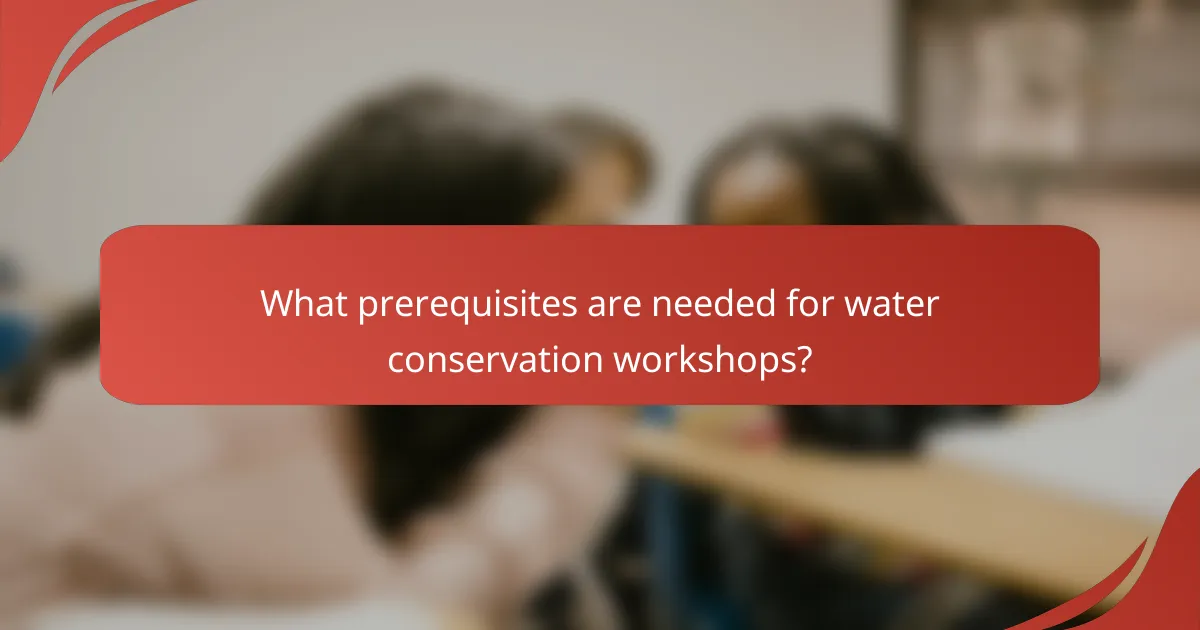
What prerequisites are needed for water conservation workshops?
Water conservation workshops typically require no formal prerequisites, making them accessible to a wide audience. Participants should be open to learning about sustainable practices and the importance of conserving water resources.
No prior experience required
Individuals interested in attending water conservation workshops do not need any previous experience in environmental science or conservation efforts. These workshops are designed for beginners and provide foundational knowledge that anyone can grasp.
Activities often include hands-on demonstrations, group discussions, and practical exercises that cater to all skill levels. This inclusive approach ensures that everyone can contribute and learn effectively.
Basic understanding of environmental issues
While no formal education is necessary, having a basic understanding of environmental issues can enhance the workshop experience. Familiarity with concepts such as climate change, resource depletion, and ecosystem health will help participants engage more deeply with the material.
Workshops may cover topics like the water cycle, the impact of droughts, and local water regulations, so a general awareness of these subjects can be beneficial. Participants are encouraged to come with questions and a willingness to explore these critical issues further.
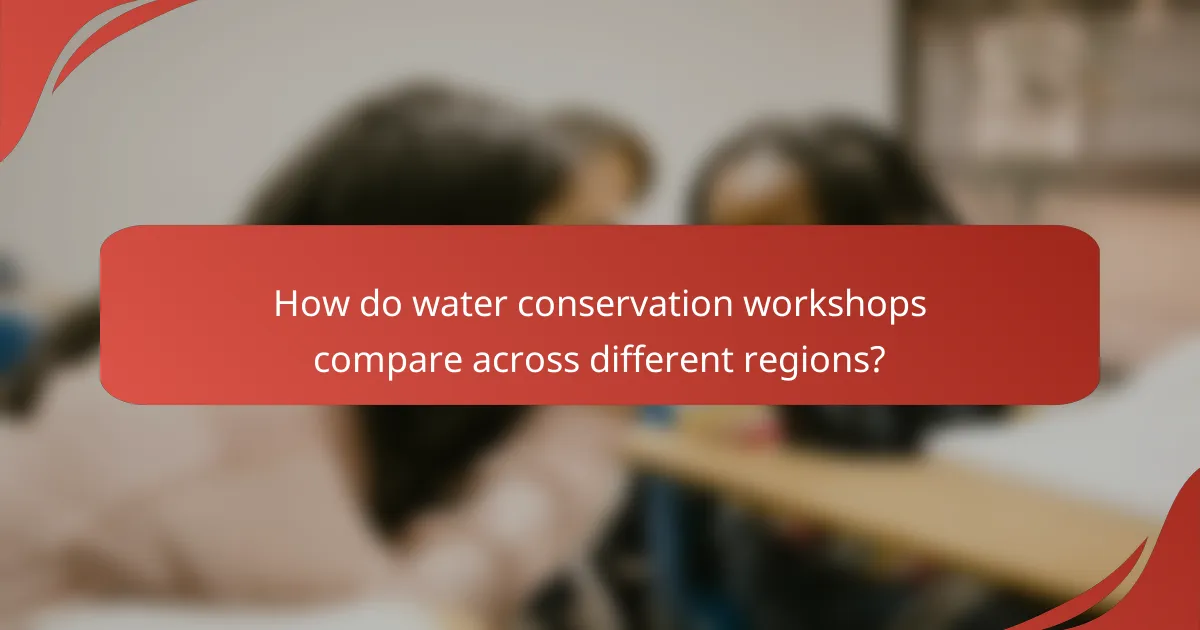
How do water conservation workshops compare across different regions?
Water conservation workshops vary significantly across regions, reflecting local water challenges, cultural practices, and community needs. These differences influence the effectiveness and participation levels in such workshops.
Regional focus on local water challenges
Each region faces unique water challenges, such as droughts in arid areas or flooding in coastal regions. Workshops often tailor their content to address these specific issues, providing relevant solutions and practices that participants can implement in their daily lives.
For example, workshops in California may emphasize drought-resistant landscaping, while those in Florida might focus on stormwater management. Understanding local water issues helps participants relate better to the material and see its practical applications.
Variations in workshop formats and lengths
Workshop formats and durations can differ widely, ranging from short, one-hour sessions to multi-day events. Some regions may prefer hands-on activities, while others might focus on lectures and discussions.
In urban areas, workshops might incorporate technology, such as online webinars, to reach a broader audience. Conversely, rural workshops may prioritize in-person gatherings to foster community engagement. Choosing the right format and length is crucial for maximizing participation and impact.
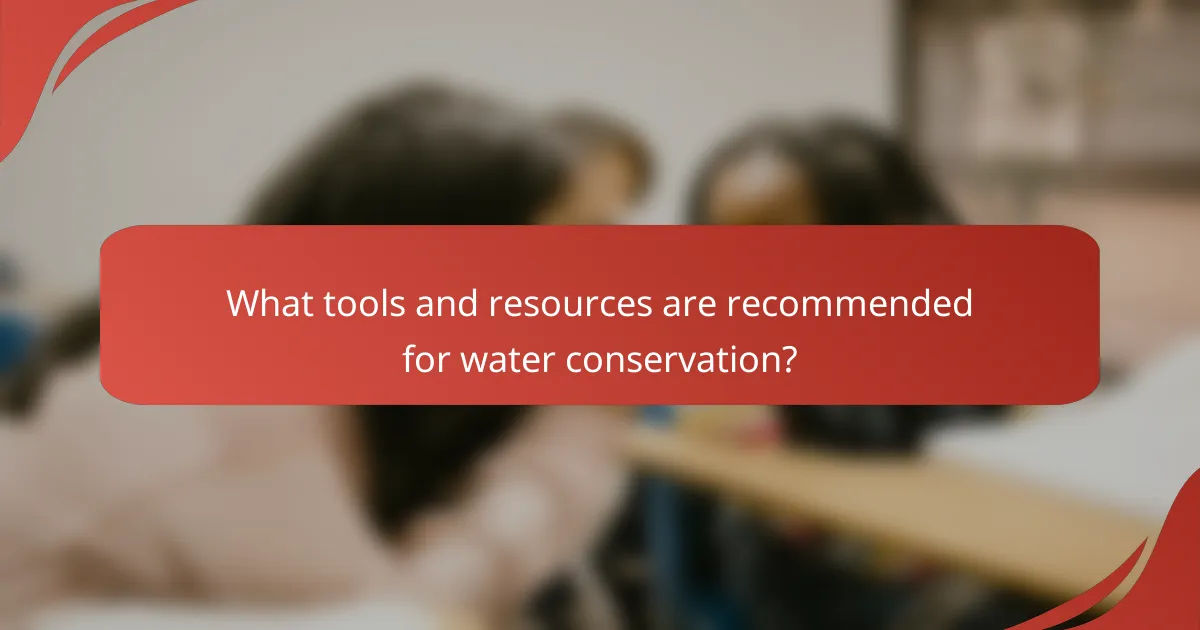
What tools and resources are recommended for water conservation?
Effective water conservation relies on various tools and resources that help individuals and communities reduce water usage. These can range from simple devices to comprehensive online platforms that educate and promote sustainable practices.
Water-saving devices and technologies
Water-saving devices are essential for reducing consumption in homes and businesses. Popular options include low-flow showerheads, faucet aerators, and dual-flush toilets, which can cut water usage by 20-60%. Rain barrels for collecting rainwater and drip irrigation systems for gardens also promote efficient water use.
When selecting water-saving technologies, consider the initial cost versus long-term savings on water bills. Many devices are easy to install and can provide a quick return on investment, making them practical choices for most households.
Online resources for further learning
Numerous online platforms offer valuable information on water conservation techniques. Websites like the Environmental Protection Agency (EPA) provide guidelines, tips, and tools for assessing water use and implementing conservation strategies. Local government websites often have specific resources tailored to regional needs and regulations.
Additionally, online courses and webinars can deepen understanding of water conservation practices. Engaging with community forums or social media groups focused on sustainability can also provide support and share innovative ideas for reducing water consumption.
